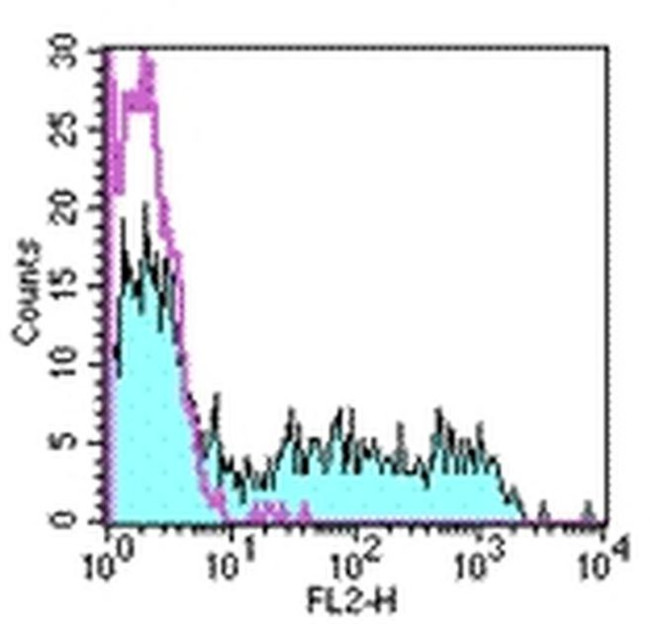Product Details
12-0949-42
Species Reactivity
Host/Isotype
Recommended Isotype Control
Class
Type
Clone
Conjugate
Excitation/Emission Max
Form
Concentration
Purification
Storage buffer
Contains
Storage conditions
Shipping conditions
RRID
Product Specific Information
Description: The DX22 monoclonal antibody reacts with human CD94, a 70 kDa type II transmembrane glycoprotein. CD94 belongs to the C-type lectin superfamily and is present as a heterodimer with NKG2 on the surface. CD94 is expressed by NK cells, a subset of gd T cells, and NKT cells and plays an important role in adhesion and activation of NK cell lineage.
Applications Reported: The DX22 antibody has been reported for use in flow cytometric analysis.
Applications Tested: This DX22 antibody has been pre-titrated and tested by flow cytometric analysis of normal human peripheral blood cells. This can be used at 5 µL (0.125 µg) per test. A test is defined as the amount (µg) of antibody that will stain a cell sample in a final volume of 100 µL. Cell number should be determined empirically but can range from 10^5 to 10^8 cells/test.
Excitation: 488-561 nm; Emission: 578 nm; Laser: Blue Laser, Green Laser, Yellow-Green Laser.
Filtration: 0.2 µm post-manufacturing filtered.
Target Information
Natural killer (NK) cells, like CD94, are a distinct lineage of lymphocytes that mediate cytotoxic activity and secrete cytokines upon immune stimulation. Several genes of the C-type lectin superfamily, including members of the NKG2 family, are expressed by NK cells and may be involved in the regulation of NK cell function. KLRD1 (CD94) is an antigen preferentially expressed on NK cells and is classified as a type II membrane protein because it has an external C terminus. Three transcript variants encoding two different isoforms have been found for this gene.
For Research Use Only. Not for use in diagnostic procedures. Not for resale without express authorization.
How to use the Panel Builder
Watch the video to learn how to use the Invitrogen Flow Cytometry Panel Builder to build your next flow cytometry panel in 5 easy steps.
References (0)
Bioinformatics
Protein Aliases: CD94; CD94 antigen; Killer cell lectin-like receptor subfamily D member 1; killer cell lectin-like receptor subfamily D, member 1; KP43; natural killer cell receptor; Natural killer cells antigen CD94; NK cell receptor
Gene Aliases: CD94; KLRD1
UniProt ID: (Human) Q13241
Entrez Gene ID: (Human) 3824

Performance Guarantee
If an Invitrogen™ antibody doesn't perform as described on our website or datasheet,we'll replace the product at no cost to you, or provide you with a credit for a future purchase.*
Learn more
We're here to help
Get expert recommendations for common problems or connect directly with an on staff expert for technical assistance related to applications, equipment and general product use.
Contact tech support


